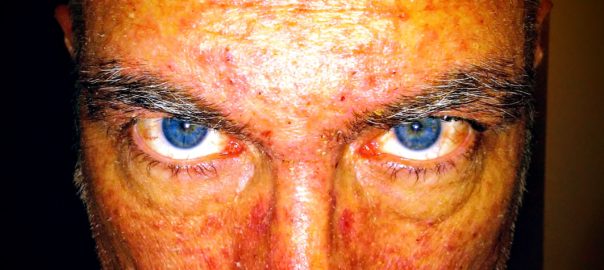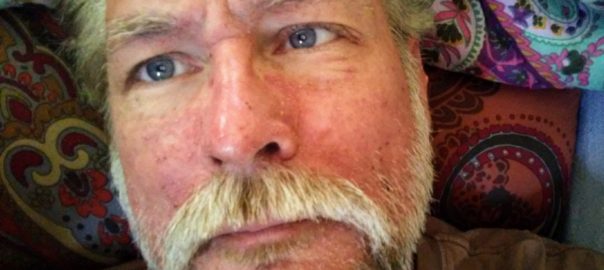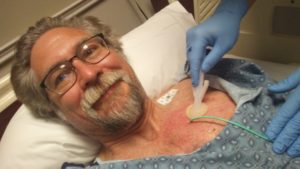Trigger Warning: Graphic and Bloody Content Related to Medical Treatment
Also, there is a link to my podcast, equally scary.
I call the following picture “Why I Can’t Have Nice Things…” Continue reading Inability To Write
Trigger Warning: Graphic and Bloody Content Related to Medical Treatment
Also, there is a link to my podcast, equally scary.
I call the following picture “Why I Can’t Have Nice Things…” Continue reading Inability To Write
By chance, cleaning through my unread emails, I stumbled across notes and pictures for a post I had planned for nearly a year ago and for some reason never published. It struck me that it could very nearly have been something I wrote just this week. There wasn’t much written, just two rough paragraphs, but it did come with a nice collection of pictures. Here is what would have been, from November 4th, 2017:
There’s no doubt that dealing with the side effects of cancer treatment can be perplexing. Patients deal with everything from digestive issues to pain to total hair loss to fatigue to stiff joints.
I have tried to gather a few different perspectives on what it feels like to die or go through the process of dying, including my lengthy interview with Michael March just prior to his death not long after I met him online. Below, I present a different perspective entirely from Claire Wineland, a Cystic Fibrosis patient who had been advocating about her disease for quite some time. It is a video I found on YouTube that she uploaded a while back, explaining her own experience with technically dying on a number of occasions from complication arising from her disease. Continue reading Dying, Redux

I spent well over 45 minutes combing scabs out of my sparse hair to commemorate the end of the second week of my third month on poziotinib. Not all at once, mind you; I had the good sense not to stand hunched over the sink for more than 20 minutes at a stretch. When I was done, or at least thought I should be, I rewarded myself by sort of washing and conditioning the wiry bristles that cover much of my scalp. Such are these minor celebrations. Continue reading Poziotinib and Me at Month Three: Feeling Crusty (But Still Onboard)

I am now into the third month of my clinical trial for poziotinib. After the first two months, I had to take two weeks off for recovery from the rash it gave me. I am, however, glad to be back on the drug for the very simple reason that it was effectively killing the cancer within me. That is not a claim I make lightly, or, sadly, have had reason to make much at all over the past year.
When I was first put on chemotherapy back at the end of 2014, it was because there were no targeted therapies or immunotherapies available, either on the market or through clinical trials, that were likely to work for me. Chemo seemed to be the only option and, in some ways, it felt like a last-ditch effort. My tumor was considered inoperable, the metastasis had spread too far and wide, and radiation was not even being presented as an option.
While I was primed for a limited response and the possibility that I might only get a few months extension from the process, it turned out that chemo kind of worked for me. It worked well enough, in fact, that I would stay on it for over two and a half years — most of that time, simply keeping the cancer growth in stasis. There was talk of the possibility of being on that drug for five or more years at one point, but not long after the two-year mark I began to notice small changes in my scans. Very small, but changes, nonetheless. Continue reading Week One: The Oozing Begins

Crouched over the kitchen sink, I surged with a repressed groan, stifling the convulsive impulse as tears broke free; I cried, uncontained, momentarily unaware why. I was so used to keeping it in, I had become disconnected from what I was actually feeling — ironic, because what I was feeling right then was disconnected.
I did not recognize my body. This vessel in which I was contained made no sense to me at all. It responded to my thoughts and commands, but it felt completely foreign. Looking down at my arms, my hands, my fingers, I recognized nothing. They could hold the dishes I was washing, turn the knob on the faucet, even scrub with the brush. But there was a clumsiness about them, an awkwardness that was hard to explain or rationalize, except to know immediately that none of that was part of my body. None of it was Me.
Such is the effect of bodily changes that occur under cancer treatment. I was experiencing a slight case of dysmorphia, that feeling of certainty that you are not in the right body. It passed, but the emotional impact lingered. Continue reading This Is Not My Body
I have friends who are long distance runners and I have watched them struggle through their pain to achieve their goals. Although I used to train for both cross country and track way back in middle-school, I can no longer run. But I do understand a thing or two about the process. And I appreciate what it means to endure hardships in search of a personal reward.

At the end of May, I began participating in a clinical trial for Poziotinib, a new targeted therapy that works on mutations in the EGFR and HER categories. Naturally, within days of my May 23rd start, I had already begun exhibiting side-effects from the new medication. The resulting rash has persisted and spread, morphing into a completely new experience for me. I thought at the time that the minor ordeal I had in preparing for the clinical trial would have been the biggest challenge of the trial itself: first I went in for a “simple” needle biopsy procedure, then I had to stay to deal with the effects when things did not go exactly according to plan. The experience even inspired an opinion piece for the Philadelphia Inquirer. But I passed over that (still relatively minor) road bump and ran headlong into the clinical trial and resulting crash back into Rashville.
Having a rash does not sound all that bad in the grand scope of things. A little salve, a dollop of willpower, and it should be easy to weather. Itching too much? Slip on some gloves or spray it with lidocaine. Rashes pass. At least it is not nausea or debilitating pain or sleeplessness. Well, at least it is not nausea. Continue reading Endurance and Payoff
Let’s get one thing straight: emotions do not cause disease. The fault of your physical illness very likely lies with something other than you. The whole notion that anything from kidney stones to cancer could be traced back to an emotional block, repressed anger, wrongs un-righted, or any other random psychological hurt from this life or a past one, is so corrupt that it should never be given credence by any rational being. Yet throngs of people with well-intentioned sounding titles like “life coach” or “healer” spread these malicious little bits of victim blaming as if they were offering salvation in a bottle of snake oil.
That said, I want it to be clear that not everyone who identifies as a healer is guilty of either victim blaming or willfully misleading those who they are trying to help. I’ve known incredibly sincere, warm, compassionate people who do their absolute best to improve the health and well-being of others through a wide swath of tools and approaches, arguably with strong results. And, frankly, many people need some form of guidance in their lives and have relied successfully on many such “coaches” to get where they need to be. I’m not condemning whole industries or forms of practice or even job titles here; this isn’t about valid occupations, but rather about those who choose to exploit the fears and insecurities of patients under the guise of offering miraculous cures through attitude adjustment. Continue reading Emotional Illness
Spoiler alert: my rash has returned.
Before I get into the details of this new leg of my journey, I’m taking a moment to reflect on the side-effects of the past. In August of last year (2017), I stopped taking chemotherapy due to signs of progression. After about a month of cleaning out my system, I noticed a serious boost in both my mental and physical energy levels. My body began shaping up. I felt really good. And I started my first “targeted” therapy, the drug Gilotrif (generic name, afatinib).
Gilotrif was highly promising at the time. It had shown some level of effectiveness on the HER2 mutation in cancer studies but was still off-label for my use because it was designed to target a very closely related mutation. I loved it at first, however, because I kept feeling better and — in comparison to my 2 years and 8 months on Alimta (generic name, pemetrexed) — there was just an amazing lack of initial side-effects. Alimta had been fairly easy to tolerate overall and I had no real complaints considering how well it had worked. But I did have some skin and digestive issues, as well as persistent fatigue, that plagued me every month. Toward the end, the skin issues were particularly bothersome, and I was beyond thrilled when they cleared up. Continue reading The Rash Is Back
Sometimes, Hollywood gets it right. There are a few films and television shows that have nailed the patient or caregiver experience quite well. More often than not, however, Hollywood uses Cancer (in the broadest sense) whenever it needs to cue a terminal illness to create sympathy without the need for exposition, or force sentimentality when character development and theme are not enough to dredge up a true emotional response.
This problem is far from new. Hollywood has long used a heavy hand to manipulate the audience. And shorthand is often required to tell a story in the confines of two hours or less. Rarely does cancer show up in a motion picture as a fully formed subject, driving the plot on its own or acting as a subplot with any sense of realism or sincerity. It is an issue that has bothered me since I began my own treatment and stumbled into a series of movies in which cancer was a mere tool for pushing emotional buttons, sometimes callously, frequently gratuitously. Warning: spoiler alert — I am probably going to ruin a few surprise plotlines in the coming paragraphs. Continue reading Hollywood and Cancer, Honesty vs a Lazy Sentimental Tool